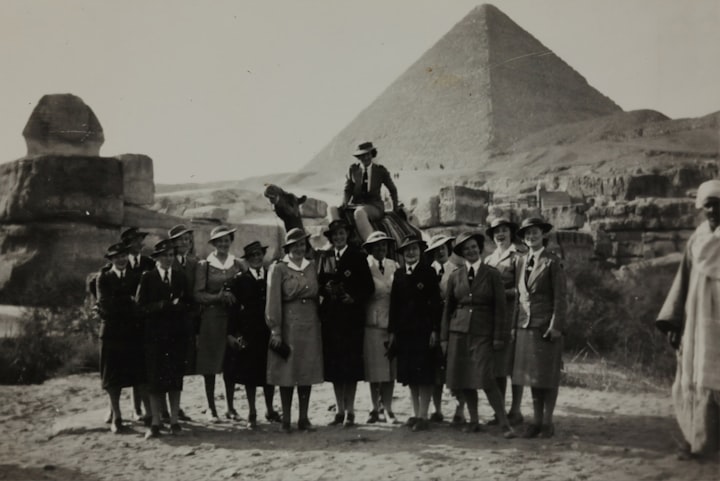
The history of Egypt is incredibly rich and spans thousands of years, with a civilization that has had a profound impact on human culture, technology, and society. Here's a general overview of the history of Egypt:
1. Ancient Egypt (c. 3100 BCE - 332 BCE): Ancient Egyptian history is often divided into several periods, including the Early Dynastic Period, the Old Kingdom, the Middle Kingdom, and the New Kingdom. During these periods, Egypt developed a sophisticated civilization with advancements in architecture, engineering, agriculture, and art. The construction of iconic structures like the pyramids took place during the Old Kingdom. The New Kingdom marked a period of military expansion, with pharaohs like Hatshepsut and Ramses II leaving their mark on history.
2. Hellenistic and Roman Periods (332 BCE - 641 CE): In 332 BCE, Alexander the Great conquered Egypt, leading to the Hellenistic period where Greek influence mixed with Egyptian culture. The Ptolemaic dynasty ruled Egypt after Alexander's death. Cleopatra, one of the most famous figures of this time, was the last Ptolemaic ruler. Egypt eventually became part of the Roman Empire in 30 BCE after Cleopatra's death.
3. Islamic Egypt (641 CE - 1517 CE): The Arab-Muslim conquest of Egypt in 641 CE marked the beginning of Islam's influence in the region. Egypt became a center of Islamic learning, commerce, and culture. The Fatimid Caliphate established Cairo as its capital and left behind significant architectural and cultural legacies.
4. Ottoman Rule (1517 CE - 1805 CE): Egypt fell under Ottoman rule in 1517, with local leaders becoming Ottoman governors. This period saw the development of Cairo as a major center of trade and power. However, by the late 18th century, Egypt's economic and political conditions were in decline.
5. Modern Egypt and Colonialism (19th to 20th centuries): Egypt became increasingly influenced by European powers in the 19th century. British control grew, leading to the British protectorate in 1914. The Egyptian nationalist movement gained momentum, culminating in the Egyptian Revolution of 1952 led by the Free Officers Movement. This movement eventually led to the establishment of the Republic of Egypt in 1953.
6. Contemporary Egypt: Since becoming a republic, Egypt has faced various political and social challenges. It played a significant role in regional politics, including wars with Israel in 1956, 1967, and 1973. The 2011 Egyptian Revolution led to the ousting of President Hosni Mubarak, marking a turning point in recent Egyptian history. Subsequent political changes have seen periods of stability and unrest.
Throughout its history, Egypt has maintained its position as a crossroads of culture, trade, and influence. Its ancient monuments, such as the Pyramids of Giza and the temples along the Nile, continue to fascinate people around the world, offering glimpses into the remarkable achievements of its past civilizations
Egyptian Art and Religion: Portals to the Divine
Art and religion were intricately interwoven in ancient Egypt. The pantheon of gods and goddesses reflected natural phenomena and aspects of life. Ra, the sun god, was considered a powerful deity. Osiris symbolized death and resurrection, while Isis was revered as a nurturing mother figure. Temples and tombs were adorned with intricate hieroglyphics, and exquisite paintings depicted scenes from daily life, funerary rituals, and the afterlife.
The Age of Conquest and Change: Hellenistic and Roman Periods (332 BCE - 641 CE)
The arrival of Alexander the Great in 332 BCE marked the end of Persian rule and the beginning of the Hellenistic period. Alexandria, a city he founded, became a center of learning and culture. Cleopatra VII, the last pharaoh of Egypt, famously aligned herself with both Julius Caesar and Mark Antony, entwining Egypt's fate with the Roman Republic.
Egypt: Islam and the Arab Conquest (641 CE - 1517 CE)
In 641 CE, Arab forces led by Amr ibn al-As conquered Egypt, introducing Islam to the region. The Abbasid Caliphate, followed by the Fatimids, ruled Egypt. The city of Cairo, founded by the Fatimids, became a hub of Islamic culture and scholarship. The architectural marvel of the Mosque of Ibn Tulun still stands as a testament to this era.
Ottoman Rule and the Modern Era (1517 CE - 1805 CE)
In 1517, the Ottoman Empire annexed Egypt, bringing it under Ottoman rule for nearly four centuries. Under Ottoman governance, Egypt thrived economically due to its strategic location. However, by the late 18th century, internal and external pressures led to a decline in prosperity.
Modern Egypt: From Monarchy to Republic
The 19th century marked the increasing influence of European powers in Egypt, with the British gradually gaining control. The construction of the Suez Canal in 1869, linking the Mediterranean and Red Seas, intensified Egypt's strategic importance. By the early 20th century, the nationalist movement gained momentum, culminating in the 1952 Egyptian Revolution led by the Free Officers Movement, which eventually led to the establishment of the Republic of Egypt in 1953.
Egypt's Role in Global Affairs and Challenges
Egypt's strategic position and rich history have shaped its modern role in global politics. It played a pivotal role in regional conflicts, including the Suez Crisis of 1956 and the Arab-Israeli conflicts. The country has faced challenges, including political instability and economic issues. The 2011 Egyptian Revolution led to the ousting of President Hosni Mubarak, reflecting the desire for political change among the populace.
Legacy and Impact
Egypt's legacy is a tapestry woven from its ancient heritage, Islamic influence, and modern struggles. The grandeur of the pyramids, the splendor of Luxor's temples, and the enigma of the Sphinx continue to captivate the world's imagination. As Egypt navigates the complexities of the modern era, its history remains a source of inspiration, offering lessons from a civilization that shaped the course of human history.





Comments
There are no comments for this story
Be the first to respond and start the conversation.